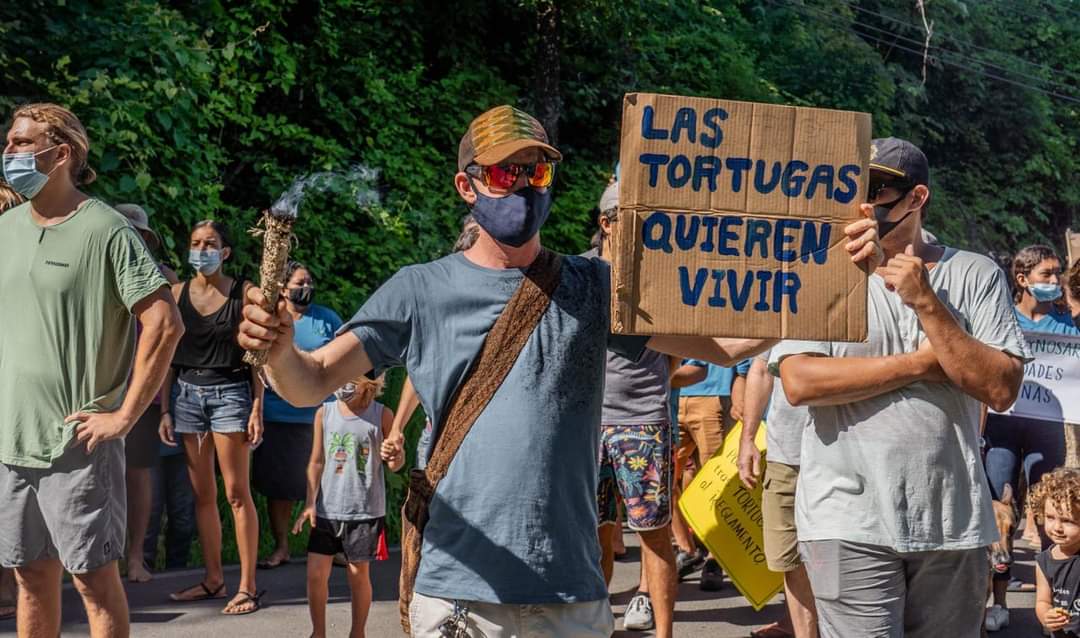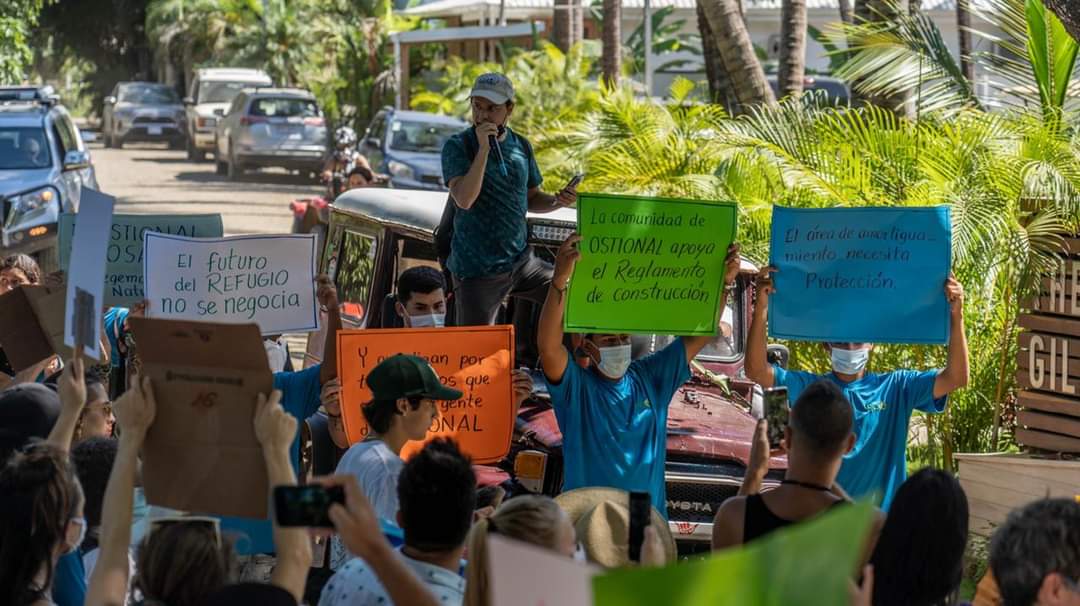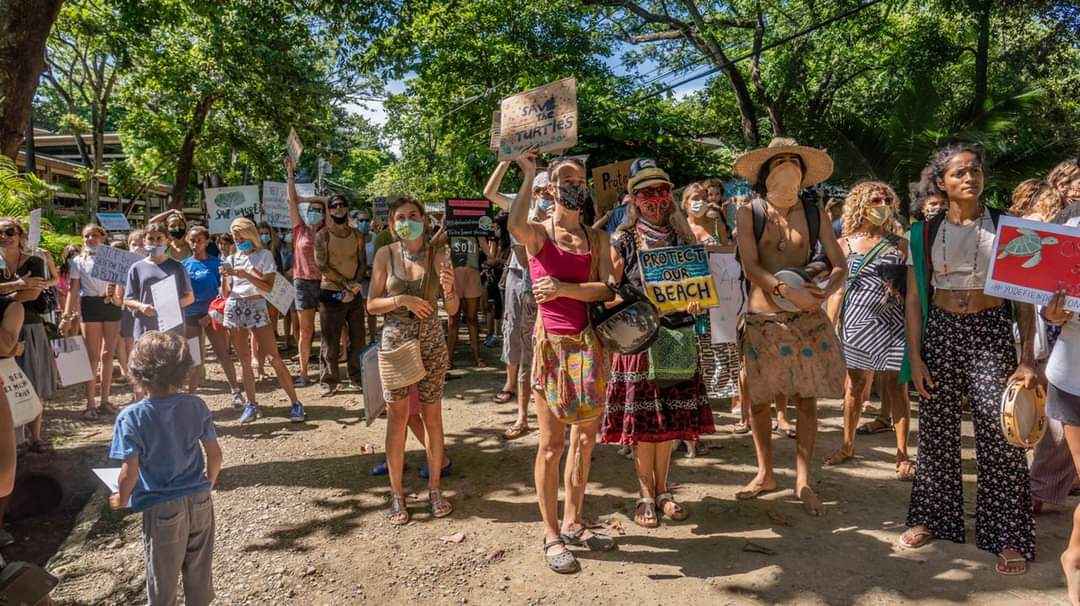24-06-2021
Nosara mobilizes in support of the construction regulations
Arturo Silva Lucas | Alba SudThe coastal community of Nosara in Guanacaste, Costa Rica, is discussing a new construction regulation that seeks to take measures to protect the Ostional Wildlife Refuge. The opposition of real estate investors and tourism interests in the area hinders the new regulations.

Photography by: Arturo Silva Lucas.
Last Saturday, June 5, World Environment Day, residents of the Guanacaste community of Nosara mobilized in support of the new constructions regulations statute. This new statute seeks to regulate future buildings in the five-kilometer buffer zone between Nosara and the Ostional Wildlife Refuge, one of the most important nesting sites in the world for sea turtles.
But the regulation met the opposition from a businessman with real estate investments in the area. Through judicial channels, he has achieved the suspension of the regulation until the courts do not resolve a claim so that it is completely discarded. This means that there is no type of regulation for construction in the buffer zone, beyond those provided by general laws and regulations of the Republic, for up to a period of two years.
The conflict clearly visualizes the socio-environmental tension that the province of Guanacaste is experiencing due to the incessant growth of real estate projects in coastal territories. In this way, a new chapter of social mobilization opens that shows the conflict generated by a tourism development model that has been possible precisely because of the lack of adequate territorial planning.
In Context
The district of Nosara, located in the canton of Nicoya, had already been the focus of our attention in a previous article. In Nosara, the cycle of migration of tourists residing mainly from the United States began in the 1960s, many years before the provincial real estate boom of the 2000s, which attracted an increasing number of new inhabitants to the rest of the provincial coasts. This led to a longer incubation time in and, therefore, more entrenched organizational forms in the district. Such is the case of the Nosara Civic Association (NCA), a local organization dating from 1975. The NCA has both foreigners and nationals in its ranks and is the main promoter of the new constructions regulations.
Despite this particularity, Nosara has not been exempt from the real estate fever in Guanacaste in recent years. In an open call meeting on June 4 summoned by the newspaper La Voz de Guanacaste, Josué Ruiz, an official from the Nicoya municipality, and Yeimy Cedeño, from the Ostional Wildlife Refuge, explained the urgency of the regulation's entry into force. According to them, the district has had a considerable increase in real estate projects in recent years, with a peak of 45 thousand square meters of construction processed only for 2019. This situation puts enormous pressure on the buffer zone, given the accelerated change in land use, which in turn puts at risk the reproduction cycle of more than 180 thousand sea turtles that nest in Ostional throughout the year.
But what does the new regulation statute say? The text proposes, on a normative basis of environmental inspiration, a series of minimum guidelines for constructions that guarantee respect for the natural life of the area. For example, any new building cannot exceed 9 or 12 meters in height depending on the distance from the Refuge, and that they must have a wastewater treatment plant. It is also established that only 50% of each of the registered lots is allowed to be built, with all lighting towards the ground or walls so as not to disorient the turtles. In addition, it appeals to technical criteria for sustainable use of aquifers, estuaries, mangroves, and estuaries mouths up to 1 km offshore.

Photo by Arturo Silva Lucas.
After passing all the administrative filters, the regulation became effective in February 2020. Three months later, the business group JBR Capital Ventures filed a precautionary measure in which it requested the suspension of the regulation until a lawsuit against the municipality of Nicoya for alleged procedural flaws in its preparation, as stated in resolution 381-2021 of the Contentious Administrative Court. After months of deliberation, this June the court accepted the precautionary measure.
The visible face of JBR Capital Ventures is the resident Jeffrey Grosshandler, owner of some land in the disputed area and owner of the Gilded Iguana hotel in Playa Guiones de Nosara. Investigations carried out by the media also include the former deputy and presidential candidate for the Liberal Union party Otto Guevara among the participants of the business group.
Since the conflict has escalated, Grosshandler's statements have been increasingly rare. On the few occasions that he has spoken, it has been through his lawyer, the former president of the Constitutional Court Ernesto Jinesta. However, Grosshandler had stated his position in the past. In January 2020, in a local podcast, he explained that the regulation threatens the economic well-being of Nosara because, according to him, it affects the capital gain of the land. Also, he affirmed that the historical lack of water in Guanacaste is already a natural limit to real estate growth. In another public statement in September 2020, he stated that the Refuge buffer zone is not part of the Nicoya canton and, therefore, the local government had no jurisdiction. Likewise, he pointed out that the coastal zone was already protected by Law 6043 of the Maritime Terrestrial Zone, that the document was never socialized, and, finally, that the regulation affects the historic inhabitants of the district who would see their right to build limited and this, according to Grosshandler, goes against the right to private property.
Even though Nosara has been an international tourism destination since the late 1960s, it does not have a Regulatory Plan. This legal void is the main loophole through which Grosshandler requests the nullity of the regulation. It alleges that by normative hierarchy a construction regulation has no legal basis if there is no Regulatory Plan.

Photo by Arturo Silva Lucas.
The arguments made by Grosshandler against the new construction regulation have found echoes in some communities near the district's main tourist niche: Guiones Beach. The integral development associations (ADI) of Bocas de Nosara, Garza, Esperanza Sur, and Delicias de Garza on May 10 of this year made public a document, of which there is a copy, in which they requested the nullity of the regulation statute. From the document, its understood that the municipality of Nicoya has never addressed the risk of natural disasters to which the houses of these communities are subjected. In the opinion of these four ADIs, the new construction regulations would make it impossible to carry out social housing projects.
In a surprise statement on June 3, through his hotel's Facebook page, Grosshandler proposed the creation of a Regulatory and Management Plan for the Refuge that is in line with economic progress “without imposing impossible measures on the poorest inhabitants” of the district. In addition to all the arguments already described, in this communication, he declared that his hotel did not participate in the lawsuit as a company and that the new construction regulations do not grant legal security to businesses in the area. Although, in the aforementioned meeting, the municipal official Josué Ruiz made it clear that only the business group that Grosshandler represents had been the one who had requested the repeal of the regulation to the local government.
#YoDefiendoOstional
In this context, the social mobilization in Nosara on June 5 is the first to take place in the province for real-estate tourism reasons since the conflict in Playa Potrero in 2015, in the neighboring canton of Santa Cruz. In both cases, what motivated community action was the threat to natural resources and spaces brought about by unplanned residential tourism growth. In Potrero it was the water, in Nosara the Ostional Wildlife Refuge.
Through a statement, the NCA called a march in support of the regulation. Close to 8 a.m. around three hundred people gathered in Guiones Beach to show their support. During the march, which took place in a peaceful and orderly manner, expressions of support could be read in both English and Spanish. Many banners referred to the importance of caring for the sea turtles and the Refuge itself, others called for community unity and some others denounced the greed of the business group that had stopped the regulation.
When the march passed in front of the Gilded Iguana hotel, owned by Jeffrey Grosshandler, different people with speakers explained in English and Spanish the reason for the activity and the details of the new constructions’ regulations statute. Near the end, and with an improvised percussion, the group of marchers chanted: "Get out Jeffrey!", "The one who doesn't jump, is Jeffrey!"
Over time, support for the new regulation has spread outside of Nosara. In October 2020, 60 people from 16 countries dedicated to research and academia expressed their support in an open letter to the municipality of Nicoya. In Costa Rica, the Ecologist Federation (FECON) in a statement on June 3 called to defend the construction regulations. FECON's support extends to what they are already providing to the Marbella community just 24 kilometers from Nosara. In Marbella real estate developers have carried out an aggressive urbanization process through the local dispossession of water management and illegal appropriation of the Maritime-Terrestrial Zone.
In recent weeks, the activity on social networks has not been little. With the hashtags #YoDefiendoOstional (#IDefendOstional) and #NosaraSomosTodos (#WeAreAllNosara), the signs of support have been increasing. On the change.org platform, the petition to request the Court to reactivate the regulations already has more than 18,000 signatures. For its part, the NCA has made available on its website a channel to report to the municipality any construction or development that puts the Refuge at risk.
In an effort to democratize the discussion, the NCA has made public the steps that were followed for the approval of the regulation. The publication shows a timeline with videos of the different meetings that, since February 2020, were held in the community with the presence of officials from the municipality and the Refuge, as well as the progressive publications in official media, in response to the accusation that the text was never socialized.
On the other hand, regarding the absence of a Regulatory Plan to annul the construction regulations, as argued by Grosshandler, the municipality of Nicoya has repeatedly stated that it does not annul a Regulatory Plan. In one of the official statements it reads:
It must be made clear that this regulation is different from a Regulatory Plan, but it is the first step towards it. The Regulatory Plan requires more control, much more technical information and this regulation becomes an input that will serve as a Contingency Plan in the regulation, that is why only three aspects are regulated: height, coverage and lighting.
As it is a multivariable territorial planning instrument and specific to the conditions of each region, the drafting of a Regulatory Plan can be extended for indefinite periods. They depend on the consent of the communities and the political will of local governments. The new constructions regulations statute is an urgent first step to remedy a borderline situation in the Nosara district.
The need for regulation
The conflict in Nosara is explained by the tourism development model that predominates on the Guanacaste coast. In an irremediable way, the regions that experience great real estate pressure are confronted between the interest to continue with investments and the need to regulate territory-land use. Despite being technical instruments, regulations like the one proposed in Nosara, or even a Regulatory Plan, depend on political conditions. In other words, a situation is not discussed until it becomes a problem that needs a solution. The way in which it has been raised and how it has been carried out is what can differentiate Nosara from other similar conflicts in the province.
The work of environmental awareness, participation and coordination that the NCA has carried out on a sustained basis for so long, stands out in a province where the power shares between local organizations and real estate developers tend to be enormously different. Along the same lines, the work that the municipality of Nicoya and the Ostional Wildlife Refuge are doing have positioned themselves as key actors in this conflict.

Photo by Arturo Silva Lucas.
There is no doubt that the problem of land use planning affects the entire population of a municipality, as the ADIs of Bocas de Nosara, Garza, Esperanza Sur, and Delicias de Garza have expressed. In a moment of urgency to solve a problem, other needs arise that had been postponed. In this way, the regulation is a political opportunity to resolve territorial, recent or historical conflicts. The conflict in Nosara is far from over. Due to the implications of the discussion, its repercussions in the rest of the province are important.
